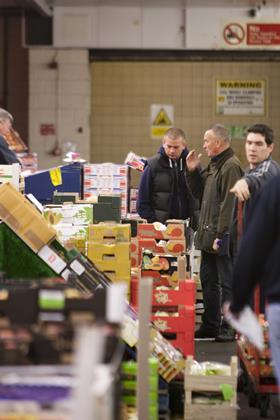
Traders at New Covent Garden Market are threatening legal action against the market authority over development plans they say jeopardise the future of their businesses.
Chairman of the Covent Garden Tenants Association, Gary Marshall, said they had “come to a point of no pass”, stating the Covent Garden Market Authority (CGMA) is trying to force through their plans against traders’ wishes. Now the long running dispute between the parties could escalate after meetings over the last eight years failed to reach an agreement.
Businesses have voiced a number of grievances with the new design, centering on a reduction in trading space for tenants and the removal of parking and loading capacity for delivery and customer vehicles, which the CGTA believes will lead to chaos, and health and safety issues, at the historic market.
Recent authority proposals to introduce controlled vehicle entry to the site as construction continues have led to further uproar from wholesale and catering tenants, who say it will “ruin” their businesses.
Speaking at a general meeting of the CGTA on Wednesday, Marshall, who also owns wholesale company Bevington Salads, told his members: “We have been challenging the government for the last eight years.
“Up until now the development has not severely affected any of your businesses; through skill and hard work you have managed to do well while we have fought to keep the market operating.
“That’s about to end so dramatically it will affect everybody.” He said that the CGMA plans imminently to remove four and a half acres of land used for parking, loading and unloading without offering alternative space for vehicles, would cause disruption to the operational viability of the market.
The CGTA have voiced frustrations that a seven-month logistics and business continuity survey is yet to provide an answer on where the customers and tenants will park as the development moves through its phases.
In a responding statement the CGMA said they “don’t anticipate” a controlled entry system: “The next phase of development is very important, which is why we’ve taken the time to carry out a large logistics exercise to ensure it works. We don’t anticipate introducing a timed entry system for the South Vehicle Car Park.”
Marshall and the association are now taking legal advice to ascertain whether it has a case to seek an injunction against the CGMA’s proposals. If legal advisors suggest there is a case, then the association will aim to raise £1million from its membership base to recruit legal representation.
Ultimately they would be prepared to mount a judicial review of the development contract, signed between CGMA and developer Vinci St Modwen, which they say will bring the redevelopment to a halt.
But the market authority maintains that the redevelopment will work for the good of the tenants and the future of the market.
They said: “We are confident that the new design provides sufficient space at peak hours. In December 2017, Arup, our logistics consultants, took detailed measurement of the numbers of vehicles on site during peak trading times across 24 hour periods and we continue to collect data every night. We’ve shared this information with our tenants, as well as consulted with them throughout the process.”
Marshall suggested that they will take further drastic action if no resolution is found, involving protests and blockades to raise awareness of the situation. He added that the redevelopment project could cost as much as three times the initial budget of £130 million and completion of the programme could rise to 10 years, until 2024, which the market authority disputes.
The CGTA believes the best option for traders would be to strip the current building back to the bare concrete and rebuild on the original footprint. They estimate this would also cut three years off the redevelopment.
Marshall concluded: “We must protect the footprint of this market as its been proven that it has worked for the last 45 years. The developer has questioned why the market would be built if it doesn’t work, well we’re saying that it isn’t going to work.
“There are 2,500 people employed by 200 firms in this market and as many as 25,000 people across London are indirectly dependent on us, in restaurants and hotels, and from caterers to loaders and lorry drivers. We are vital to the mayor’s London food plan.”



